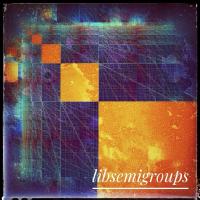template<typename Word>
class libsemigroups::Presentation< Word >
Defined in presentation.hpp.
This class template can be used to construction presentations for semigroups or monoids and is intended to be used as the input to other algorithms in libsemigroups. The idea is to provide a shallow wrapper around a vector of words of type Word. We refer to this vector of words as the rules of the presentation. In addition to the rules, a Presentation object has an alphabet.
In a valid presentation, rules will only consist of letters from within the alphabet; however, for performance reasons, it is possible to update both the rules and the alphabet independently of each other. For this reason, it is possible for the alphabet and the rules to become out of sync. The Presentation class provides some checks that the rules define a valid presentation, and some related functionality is available in the namespace libsemigroups::presentation.
- Template Parameters
-
| Word | the type of the underlying words. |
|
| | Presentation () |
| | Default constructor.
|
| |
| | Presentation (Presentation &&) |
| | Default move constructor.
|
| |
| | Presentation (Presentation const &) |
| | Default copy constructor.
|
| |
| letter_type | add_generator () |
| | Add a generator.
|
| |
| Presentation & | add_generator (letter_type x) |
| | Add x as a generator.
|
| |
| Presentation & | add_generator_no_checks (letter_type x) |
| | Add x as a generator.
|
| |
| template<typename Iterator1, typename Iterator2> |
| Presentation & | add_rule (Iterator1 lhs_begin, Iterator1 lhs_end, Iterator2 rhs_begin, Iterator2 rhs_end) |
| | Add a rule to the presentation and check it is valid.
|
| |
| template<typename Iterator1, typename Iterator2> |
| Presentation & | add_rule_no_checks (Iterator1 lhs_begin, Iterator1 lhs_end, Iterator2 rhs_begin, Iterator2 rhs_end) |
| | Add a rule to the presentation.
|
| |
| word_type const & | alphabet () const noexcept |
| | Return the alphabet of the presentation.
|
| |
| template<typename Return = Presentation&> |
| auto | alphabet (char const *lphbt) -> std::enable_if_t< std::is_same_v< std::string, word_type >, Return > |
| | Set the alphabet from string literal.
|
| |
| Presentation & | alphabet (size_type n) |
| | Set the alphabet by size.
|
| |
| Presentation & | alphabet (std::initializer_list< typename word_type::value_type > const &lphbt) |
| | Set the alphabet from std::initializer_list.
|
| |
| template<typename Return = Presentation&> |
| auto | alphabet (std::string_view lphbt) -> std::enable_if_t< std::is_same_v< std::string, word_type >, Return & > |
| | Set the alphabet from string_view.
|
| |
| Presentation & | alphabet (word_type &&lphbt) |
| | Set the alphabet from rvalue reference.
|
| |
| Presentation & | alphabet (word_type const &lphbt) |
| | Set the alphabet const reference.
|
| |
| Presentation & | alphabet_from_rules () |
| | Set the alphabet to be the letters in the rules.
|
| |
| bool | contains_empty_word () const noexcept |
| | Return whether the empty word is a valid relation word.
|
| |
| Presentation & | contains_empty_word (bool val) noexcept |
| | Set whether whether the empty word is a valid relation word.
|
| |
| bool | in_alphabet (letter_type val) const |
| | Check if a letter belongs to the alphabet or not.
|
| |
| size_type | index (letter_type val) const |
| | Return the index of a letter in the alphabet.
|
| |
| size_type | index_no_checks (letter_type val) const |
| | Return the index of a letter in the alphabet.
|
| |
| Presentation & | init () |
| | Remove the alphabet and all rules.
|
| |
| letter_type | letter (size_type i) const |
| | Return a letter in the alphabet by index.
|
| |
| letter_type | letter_no_checks (size_type i) const |
| | Return a letter in the alphabet by index.
|
| |
| Presentation & | operator= (Presentation &&) |
| | Default move assignment operator.
|
| |
| Presentation & | operator= (Presentation const &) |
| | Default copy assignment operator.
|
| |
| Presentation & | remove_generator (letter_type x) |
| | Remove x as a generator.
|
| |
| Presentation & | remove_generator_no_checks (letter_type x) |
| | Remove x as a generator.
|
| |
| void | throw_if_alphabet_has_duplicates () const |
| | Check if the alphabet is valid.
|
| |
| void | throw_if_bad_alphabet_or_rules () const |
| | Check if the alphabet and rules are valid.
|
| |
| void | throw_if_bad_rules () const |
| | Check if every word in every rule consists only of letters belonging to the alphabet.
|
| |
| template<typename Iterator1, typename Iterator2> |
| void | throw_if_letter_not_in_alphabet (Iterator1 first, Iterator2 last) const |
| | Check if every letter in a range belongs to the alphabet.
|
| |
| void | throw_if_letter_not_in_alphabet (letter_type c) const |
| | Check if a letter belongs to the alphabet or not.
|
| |
